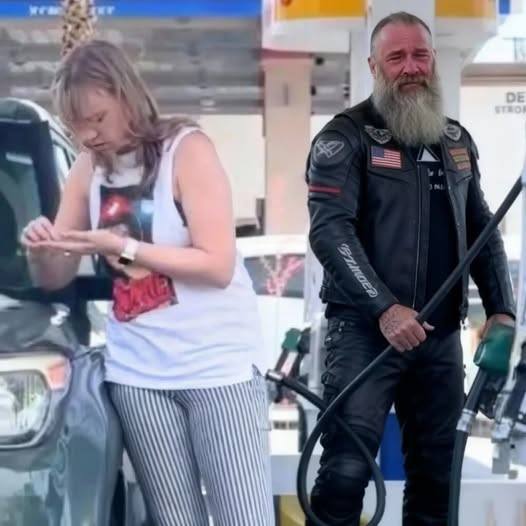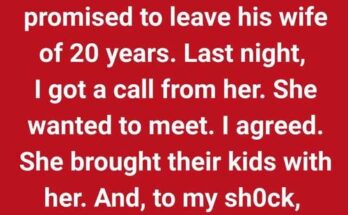I was filling up my motorcycle on a quiet afternoon when I overheard a young woman speaking in a voice filled with worry. She stood beside an older car, her hands shaking as she counted a few coins. Her distress was impossible to ignore.
She looked barely twenty, with her hair pulled back and traces of tears still on her cheeks. Something about her posture—tense, guarded, almost apologetic—told me she was carrying far more than the burden of an empty fuel tank.
I walked over and gently said, “I already started the pump for you. It’s taken care of.”
Immediately, she whispered, “Please don’t. My boyfriend will be upset if he thinks someone helped me. He’ll think I asked for it.”
Her fear wasn’t loud—it was quiet, practiced, deeply ingrained. The more she explained, the more it became clear she felt she wasn’t allowed to accept even the smallest kindness.
She told me she usually put in only what little change she had, just enough to get home. It was then that something in me shifted. After decades on the road, I’ve learned to recognize when someone needs help but feels unable to ask for it.
When the tank filled completely, she stared at the pump in panic. “I don’t know how to explain this. He’ll be upset. Please, just go.”
But walking away didn’t feel right. Not when someone so young was this afraid.
A moment later, a man her age stepped out of the store. His posture was sharp, his tone suddenly tense as he approached her. He questioned the full tank immediately, and she tried—so hard—to reassure him. Yet even from a distance, I could see the strain in her expression.
I stepped in with calm, steady words. “I chose to help. She didn’t ask.”
The moment grew tense, but I kept my voice even. I asked the young woman—her name was Brandi—whether she felt safe. She hesitated. Then quietly said something that changed everything:
“Help me.”
That was all anyone needed to hear.
A nearby couple called for assistance. Within minutes, help arrived. Officers spoke with Brandi gently, away from the crowd, and their calm approach allowed her to finally share how overwhelmed she had been feeling. She explained she’d moved far from home months earlier and had been trying to manage her life under increasing pressure.
When the officers checked, they found several concerning issues connected to the young man. They handled the situation with professionalism and care, making sure everyone stayed safe.
Brandi’s relief was visible the moment she realized she was no longer navigating things alone.
A trained advocate soon arrived to support her, offering resources and a safe place to stay. Before leaving, Brandi walked over to me and thanked me with tears in her eyes.
“You didn’t just help with gas,” she said. “You saw me.”
I told her the only thing that mattered was that she felt safe moving forward.
Before she left, I gave her some money to help her travel home to her family. She promised to pay it forward one day.
Two weeks later, I learned she’d made it home safely, reunited with her mom, and started rebuilding her life. Over time, she settled into a new path—one focused on supporting others. She trained to become a social worker and now helps people experiencing the kind of stress and isolation she once felt herself.
She sometimes sends small updates—photos, notes, and a picture of her car with a full tank.
I shared her story with my riding group. Someone said, “Sometimes the right words at the right moment make all the difference.”
And it’s true.
You never know what someone is carrying. A small gesture—a full tank of gas, a simple question—can open a door they’ve been too afraid to reach for.
Sometimes the greatest strength we have is the willingness to notice when someone needs kindness.



